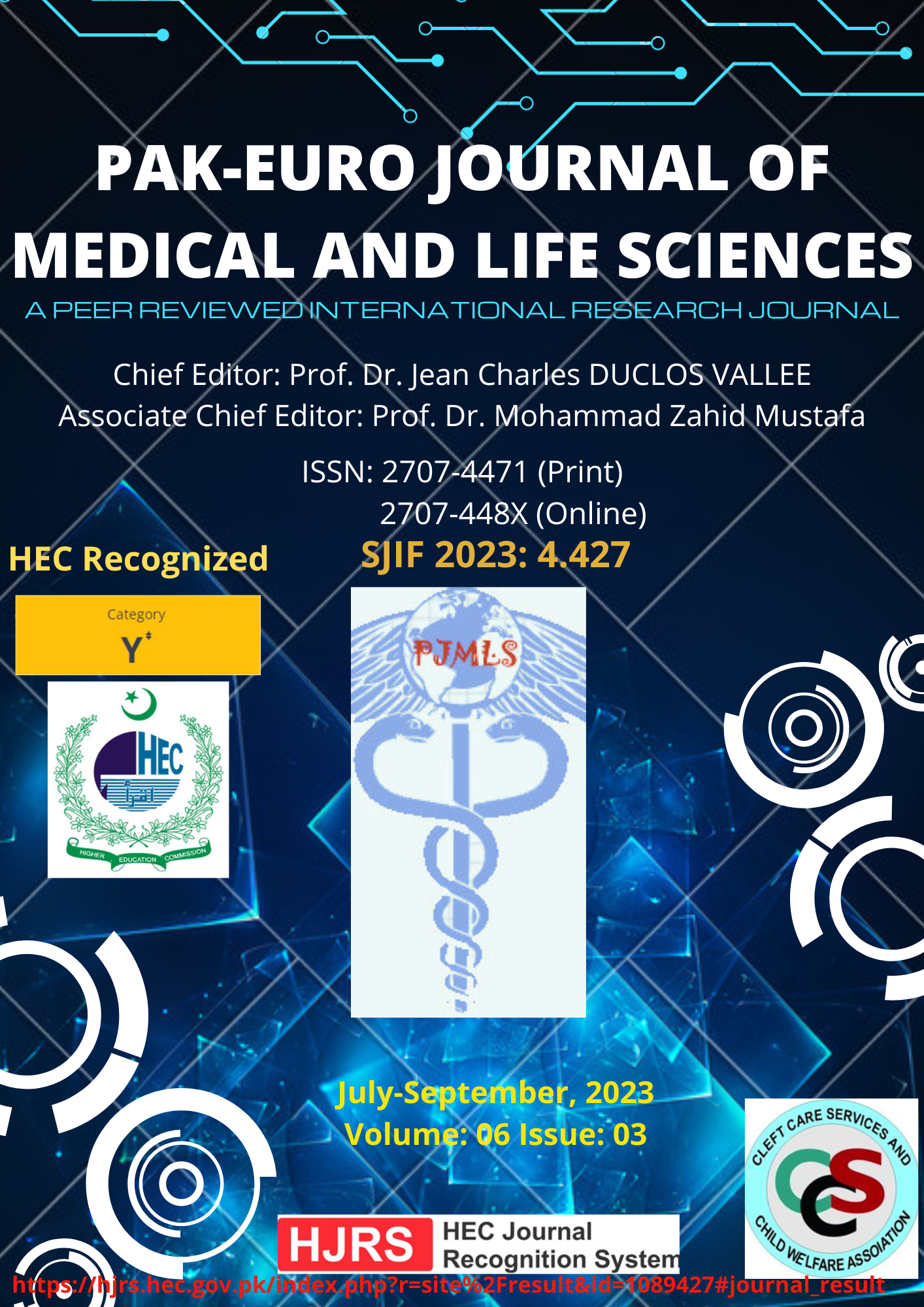Unraveling the Complexity of Immune Checkpoint Modulation in Gastrointestinal Malignancies
DOI:
https://doi.org/10.31580/3a0b5z06Keywords:
Cytokines, Gastrointestinal cancers, Gene expression, Immunological markers, Malignancies, Tumor microenvironmentAbstract
Gastrointestinal cancers are accountable for the highest mortality rates on a global scale, including gastric adenocarcinomas and hepatocellular carcinoma on a large scale. Tumor microenvironment has a vital role in influencing tumor behavior. Evading immune destruction prevents the immunological killing of cancer cells by T and B lymphocytes, macrophages and natural killer cells in the early stages of cancer progression. To determine the relative expression level of immunological markers and cytokines (CTLA-4, PD-1, PDL-1, LAG-3, IL-7R, and IL-12A) in tumor microenvironment of patients with gastrointestinal malignancies and their correlation with clinicopathological characteristics. Blood samples of gastrointestinal malignant patients were collected, followed by RNA extraction and cDNA synthesis for gene expression. The quantification of immune checkpoints and cytokines was carried out on the DNA using RT-qPCR. There is a significant increase in CTLA-4 expression in all the GIT cancers as compared to healthy controls. A slight increase in LAG-3 expression was observed in esopharyngeal carcinoma patients as compared to other GIT cancers. Downregulation of IL-7R and IL-12A was observed in all GIT cancers, however; gastric cancer shows a notable decrease in expression as compared to other GIT cancers and controls. Genetic expression of targeted immune checkpoints and cytokines is associated with cancer progression and helpful in unveiling the different mechanisms through which tumor microenvironment evades the immune system. This will lead to the development of effective immune checkpoint inhibitors as high-treatment efficacy drugs which activate the immune system, contributing to improved prognosis and therapeutic methods in aggressive tumor.
References
Farhana A, Alsrhani A, Khan YS, Rasheed Z. Cancer bioenergetics and tumor microenvironments—Enhancing chemotherapeutics. Cancers. 2023;15(15):3836.
Daniyal M, Ahmad S, Ahmad M, Asif HM. Risk factors and epidemiology of gastric cancer in Pakistan. Asian Pacific Journal of Cancer Prevention. 2015; 16(12):4821-4.
Asghar MS, Khan NA, Kazmi SJ, Hassan M, Rasheed U, Jawed R, Yaseen R, Naqvi SA. Clinical, epidemiological, and diagnostic characteristics of esophageal carcinoma in a Pakistani population. Annals of Saudi Medicine. 2021;41(2):91-100.
Mohameda AS, El-Rebey HS, AboElnasr LS, Abdou AG. The role and relationship between programmed death ligand 1 and cytotoxic T lymphocyte-associated antigen-4 immunohistochemical expression in colorectal carcinoma patients: an impact on outcome. ecancermedicalscience. 2021;15.
Sung H, Ferlay J, Siegel RL, Laversanne M, Soerjomataram I, Jemal A, Bray F. Global cancer statistics 2020: GLOBOCAN estimates of incidence and mortality worldwide for 36 cancers in 185 countries. CA: a cancer journal for clinicians. 2021;71(3):209-49.
Gaudino SJ, Kumar P. Cross-talk between antigen presenting cells and T cells impacts intestinal homeostasis, bacterial infections, and tumorigenesis. Frontiers in immunology. 2019;10:360.
Lodewijckx I, Cools J. Deregulation of the interleukin-7 signaling pathway in lymphoid malignancies. Pharmaceuticals. 2021;14(5):443.
Um e Habiba U, Rafiq M, Khawar MB, Nazir B, Haider G, Nazir N. The multifaceted role of IL-12 in cancer. Advances in Cancer Biology-Metastasis. 2022;5:100053..
Zhang C, Zhang J, Niu J, Zhou Z, Zhang J, Tian Z. Interleukin-12 improves cytotoxicity of natural killer cells via upregulated expression of NKG2D. Human immunology. 2008;69(8):490-500.
Ben S, Zhu Q, Chen S, Li S, Du M, Xin J, Chu H, Zhang Z, Wang M. Genetic variations in the CTLA-4 immune checkpoint pathway are associated with colon cancer risk, prognosis, and immune infiltration via regulation of IQCB1 expression. Archives of Toxicology. 2021;95:2053-63.
Derakhshani A, Hashemzadeh S, Asadzadeh Z, Shadbad MA, Rasibonab F, Safarpour H, Jafarlou V, Solimando AG, Racanelli V, Singh PK, Najafi S. Cytotoxic T-lymphocyte antigen-4 in colorectal cancer: another therapeutic side of capecitabine. Cancers. 2021;13(10):2414.
Mastracci L, Grillo F, Parente P, Gullo I, Campora M, Angerilli V, Rossi C, Sacramento ML, Pennelli G, Vanoli A, Fassan M. PD-L1 evaluation in the gastrointestinal tract: From biological rationale to its clinical application. Pathologica. 2022;114(5):352.
Stenzel PJ, Hörner N, Foersch S, Wagner DC, Tsaur I, Thomas A, Haferkamp A, Macher-Goeppinger S, Roth W, Porubsky S, Tagscherer KE. Nivolumab Reduces PD1 Expression and Alters Density and Proliferation of Tumor Infiltrating Immune Cells in a Tissue Slice Culture Model of Renal Cell Carcinoma. Cancers. 2021;13(18):4511.
Dosset M, Vargas TR, Lagrange A, Boidot R, Végran F, Roussey A, Chalmin F, Dondaine L, Paul C, Marie-Joseph EL, Martin F. PD-1/PD-L1 pathway: an adaptive immune resistance mechanism to immunogenic chemotherapy in colorectal cancer. Oncoimmunology. 2018;7(6):e1433981.
Wang W, Chen D, Zhao Y, Zhao T, Wen J, Mao Y, Chen C, Sang Y, Zhang Y, Chen Y. Characterization of LAG-3, CTLA-4, and CD8+ TIL density and their joint influence on the prognosis of patients with esophageal squamous cell carcinoma. Annals of translational medicine. 2019;7(23).
Guo M, Yuan F, Qi F, Sun J, Rao Q, Zhao Z, Huang P, Fang T, Yang B, Xia J. Expression and clinical significance of LAG-3, FGL1, PD-L1 and CD8+ T cells in hepatocellular carcinoma using multiplex quantitative analysis. Journal of translational medicine. 2020;18(1):1-3.
Lavacchi D, Fancelli S, Buttitta E, Vannini G, Guidolin A, Winchler C, Caliman E, Vannini A, Giommoni E, Brugia M, Cianchi F. Perioperative tailored treatments for gastric cancer: times are changing. International Journal of Molecular Sciences. 2023;24(5):4877.
Belarif L, Danger R, Kermarrec L, Nerrière-Daguin V, Pengam S, Durand T, Mary C, Kerdreux E, Gauttier V, Kucik A, Thepenier V. IL-7 receptor influences anti-TNF responsiveness and T cell gut homing in inflammatory bowel disease. The Journal of clinical investigation. 2019;129(5):1910-25.
Jang SI, Cho JH, Kim SY, Hong IY, Park JS, Lee HS, Park G, Kim JK, Lee HK, Lee DK. Validation of IL-7R as an immunological biomarker for human pancreatic ductal adenocarcinoma. Cancers. 2022;14(3):853.
Bai Z, Zhou Y, Ye Z, Xiong J, Lan H, Wang F. Tumor-infiltrating lymphocytes in colorectal cancer: the fundamental indication and application on immunotherapy. Frontiers in Immunology. 2022;12:808964.
Wang Q, Cheng F, Ma TT, Xiong HY, Li ZW, Xie CL, Liu CY, Tu ZG. Interleukin-12 inhibits the hepatocellular carcinoma growth by inducing macrophage polarization to the M1-like phenotype through downregulation of Stat-3. Molecular and cellular biochemistry. 2016;415:157-68.
Downloads
Published
Issue
Section
License
Copyright (c) 2023 Pak-Euro Journal of Medical and Life Sciences

This work is licensed under a Creative Commons Attribution 4.0 International License.






